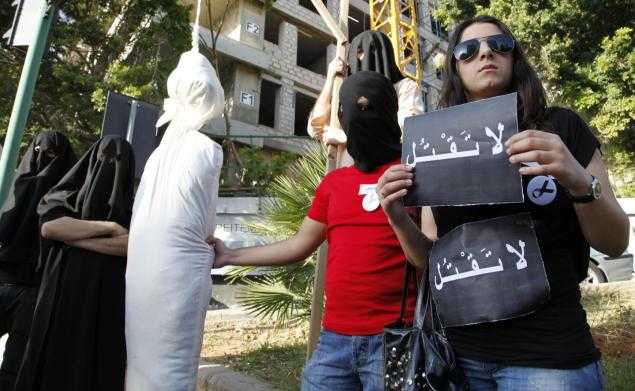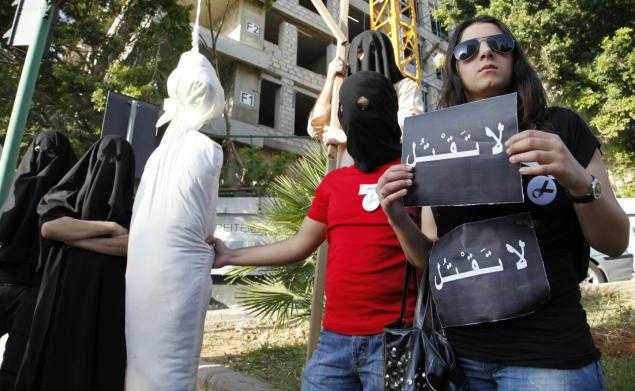Saudi Arabia: Country Executes 157 People in 2015, Highest in 20 Years, Advocacy Groups Say:

United Arab Emirates, DUBAI — At least 157 executions were carried out by Saudi Arabia with beheadings reaching their maximum degree in the kingdom in two decades, according to a number of advocacy groups that track the death penalty world-wide, in 2015.
Coinciding with the rise in executions is the number of individuals executed for non-lethal violations that judges have broad discretion to rule on, especially for drug-related crimes.
Rights group Amnesty International said in November that at least 63 people were executed since the beginning of the year for drug-related violations. Amnesty said Saudi Arabia had surpassed its maximum degree of executions since 1995, when 192 executions were recorded.
But while some crimes, including premeditated homicide, may take set punishments under Saudi Arabia’s interpretation of the Islamic law, or Shariah, drug-related violations are considered “ta’zir”, meaning neither the offense nor the punishment is described in Islam.
Discretionary judgments for “ta’zir” offenses have resulted in arbitrary opinions with disputatious results.
The man charged with the same violations and detained with him received a 10-year prison sentence, despite having earlier arrests associated with drug trafficking.
Human Rights Watch found that of the first 100 prisoners 56 was based on judicial discretion and not for offenses for which a particular death penalty punishment is mandated by Islamic law.
Shariah scholars hold significantly different views on the use of the death penalty, especially for cases of “ta’zir.”
Delphine Lourtau, research director at Cornell Law School’s Death Penalty Globally, includes that there are Shariah law specialists “whose perspectives are that procedural safeguards surrounding capital punishment are really so tight they make death penalty nearly nearly hopeless.”
She says in Saudi Arabia, defendants aren’t supplied defense lawyers and in numerous instances of South Asians arrested for drug trafficking, they’re not supplied translators in court hearings.
Emory Law professor and Shariah scholar Abdullahi An-Naim said because there’s an “built-in infallibility in court systems,” no judicial system can promise to apply an immutable, infallible kind of Shariah.
“There’s a difference between what Islam is and what Islam is as comprehended by human beings,” he said. “Shariah was never meant to be coercively employed by the state.”
Not and practically anything becomes an interpretation of Shariah Shariah itself, An-Naim said.
Of the four major schools of thought of Islam, the underpinning of Saudi Arabia’s legal system is founded on the old-fashioned Hanbali division and an ideology broadly called Wahhabism.
HRW’s Middle East researcher Adam Coolge says 158 individuals were executed by Saudi Arabia in total in 2015 compared to 90.
A caseworker for Reprieve, Catherine Higham, which works against the death penalty globally, says her organization. Though it does declare individual executions in state media through the year, Saudi Arabia will not release yearly tallies.
Saudi law allows for execution in instances of drug violations, homicide and rape. Though rarely carried out, the death penalty also applies to apostasy, infidelity and witchcraft.
Because Saudi Arabia carries out most executions through beheading and at times in public, it’s been compared to the extremist Islamic State group, which claims to be applying Shariah and also carries out public beheadings.
This is firmly rejected by Saudi Arabia.
Unlike the extrajudicial beheadings IS carries out against others and hostages, the kingdom says before it’s carried out its judiciary procedure needs at least 13 judges at three rates of court to rule in favor of a death sentence. Saudi officials also claim executions are geared toward fighting crime.
Despite the kingdom’s record amount of executions in 2015, Amnesty International says China, where advice about the death penalty is a “state secret,” is considered to carry out more people the remaining portion of the planet ‘s figures joined.
Another organization called Iran Human Rights, which is located in Oslo, Norway, and follows executions, said at least 648 people were executed in the Islamic Republic in the very first six months of 2015, with over two thirds for substance violations.
Reprieve says at least 315 individuals have been executed by Pakistan in 2015, subsequent to the nation lifted a moratorium on executions this past year following a December 2014 Taliban assault on a school that killed 150 people, the majority of them youngsters. Just a fraction of these have been individuals convicted of a terrorist attack.





